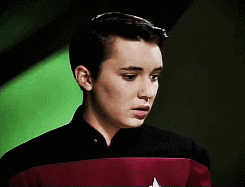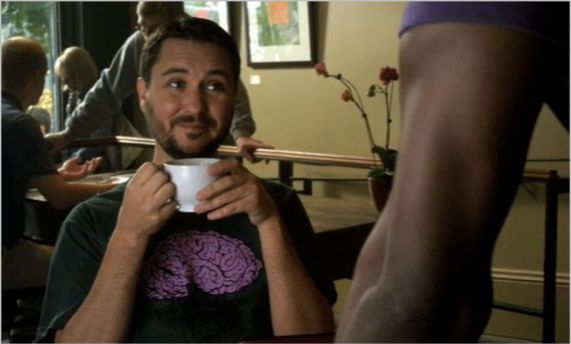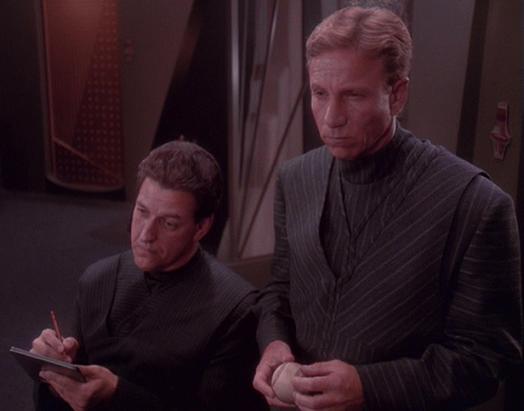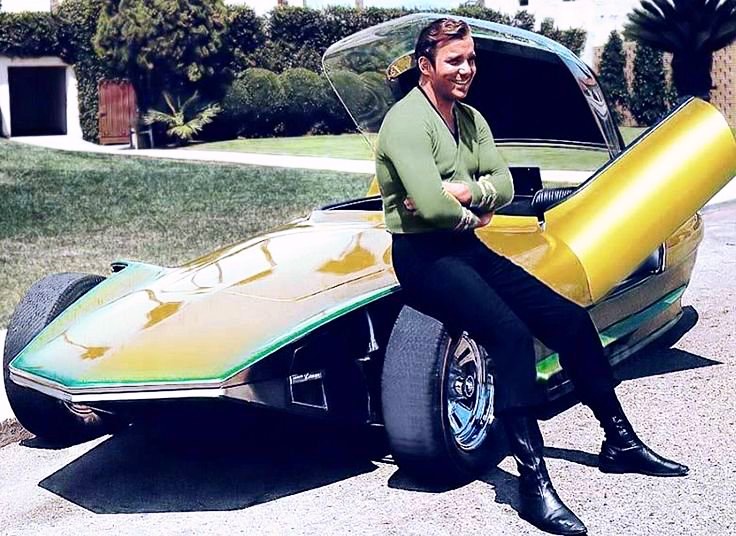

It gets better – but honestly, you might just want to skip ahead to Season 2
Eh, I’m a completionist. And I have access to ST:DIS until GoT wraps up, so I might as well watch them all.
Not even close to being interested in the JJ-verse or ST:D. I see the failure to follow up at the point where the Roddenberry series and movies left off as being a completely missed opportunity. We have, after all, the following setup:
-
The Founders of the Dominion are both defeated through threat of extinction, and saved from extinction by the Federation. The diplomatic repercussions of this should be complicated indeed.
-
The Federation itself has faced an existential crisis and been severely damaged. Section 31 has the dubious distinction of having won the war, but Star Fleet actions to limit the damage of Section 31’s plans have brought the war to an immediate end without the protracted fighting that leaving the Founders to die out would have incurred. The tensions between Fleet, government and Section 31 should be at an all-time high.
-
Cardassia has been severely damaged as a result of the war. The lore suggests a move to democracy and a large role for Elim Garak (which makes for an interesting springboard - Garak is a complex and competent character). I would expect ancien régime remnants keeping the pot boiling there. Diplomatic relations with Bejor and the Federation should be quite fluid.
-
The Romulan Empire has been gutted by the destruction of its home world, a destruction that is incontrovertibly a direct result of its domestic policies. The Federation stops further attacks by the Scimitar (self-interest here) and aids the Empire. There are many possible outcomes of this sequence of events, anything from the Empire joining the Federation to the rise of a highly reactionary “we-were-stabbed-in-the-back” revanchist rump state.
-
The Klingon Empire, an entity most closely resembling Shogunate Japan, is slowly becoming backward and irrelevant. There is potential to explore social change vs reactionary forces, especially while factoring in the influence of Worf and Martok.
The post-war situation is a potentially fraught one, subject to many stresses. Damaged or not, the Federation comes out of the war as the dominant polity in the region. What will result from this? This is easily a source of complex and plausible conflicts, both moral and physical, to drive storylines, and it has been left withering on the vine.
So with the series finale of discovery
All events are covered up and we’re now on the enterprise. Unfortunately that name change is taken.
I don’t think we’re going to see the Enterprise again for a while, if ever
but I guess I’ve been wrong before
Anyway, that last episode was too much. Burnham was was too much of a Mary Sue character, the Epic Space Battle was too much, the reunion of Stamets and Culber was so over-the-top I thought it must be a hallucination, and the business of swearing everybody to secrecy wasn’t even necessary. I mean, I guess they probably do the same thing every other time people invent time travel on Star Trek, but we never had to watch it before.
I think they have a department for that.

When Star Trek Discovery begins airing later this year, it’ll bring some new changes to Gene Roddenberry’s world, including an overarching, serialized story, rather than an episodic season.
Um, the last seasons of Deep Space Nine, the Time War and the Expanse arcs of Enterprise…
And shouldn’t it be Roddenberry’s galaxy?
That Discovery is doing story arcs is highly cool. I just wish they’d has found a reporter who had, at minimum, read the IMDB summaries for the previous shows.
I read somewhere that Heroes, another show Fuller worked on, was also supposed to follow different characters each season, and they didn’t manage to follow through with it that time either …
From the season two premiere (paraphrased):
Pike: There are no chairs in the ready room?
Burnham: Yeah, that’s intentional. Lorca didn’t want people spending a lot of time here. He wasn’t all that big on dialogue.
…Between that and the legitimate character growth that Stametz has achieved since his introduction, I definitely have higher hopes for the second season.
Okay, I’ve finished Discovery season two.
I have thoughts. It’ll take some time to organize them to the point where I can express them, but I think I can share general impressions:
- Despite the inclusion of certain… controversial elements from Star Trek lore, I think season two was better Trek than season one. That said, I think that season one featured better storytelling.
- I want an Anson Mount/Rebecca Romijn (
 ) TOS prequel aboard the Enterprise.
) TOS prequel aboard the Enterprise. - Wow, that all wrapped up really neatly. Maybe excessively so.
- This show needs to take a break from having absolutely everything centred around Burnham.
… Yeah, I think that’s the short of it. As I said before, I’ll probably come back to write in more detail once I’ve digested a bit.
Okay.
This season (henceforth DISC 2, an abbreviation which I can’t take credit for) moved at breakneck pace. They trimmed off almost every piece of every episode that didn’t need to be there, which meant that there was really no time to release any tension (contrast with the latest two episodes of GoT, which are all about giving the audience that chance to breathe before the next big battle). To put a point on it: this season cut so much off that two episodes certainly necessary for character development, and arguably necessary for the plot to make sense, were cut down to fifteen minutes each and sidelined into “Short Treks,” which I only knew I had to watch before the two-part season finale because I’ve been following along, reading reviews of each episode as they were released.
This has also been the most serialized Trek; even more so than DS9. There are certain arcs that you have to watch in order for DS9, but given even a vague understanding of the Sisko, Garak, and the Federation/Dominion War, you can watch “In the Pale Moonlight” and not miss a whole lot. DISC 2, on the other hand, always proceeds directly from the end of one episode to the start of the next. You can’t skip, say, “Saints of Imperfection,” because then you wouldn’t know where Culber reborn comes from.
The breakneck pace really hurt the show in terms of character development, which is a continuing problem from season one. There are a few tiers of characters:
- Burnham (and maybe Tyler; if not, he’s in the next tier)
- Saru, Stametz, Tilly, Lorca, Pike and Spock
- Culber, Sarek, Amanda, Reno, Georgiou, L’Rell, Cornwell, Mudd
- Everyone else
This becomes a problem when you have an entire episode which focuses around the death of a character who isn’t top-tier. For example:
The episode “Project Daedalus” (which is a horrible name for that episode, as it’s a throwaway line towards the end to set up the next episode).
In a previous episode, we were shown that Airiam (who gets a grand total of four words on the Discovery cast wiki page), had been infected by a virus from the future. In the episode in question, we’re told that she was horribly injured, and her partner was killed, in what I think was a shuttlecraft crash. She survived but needed considerable cybernetic augmentation. This augmentation included the ability to store memories digitally, and a requirement to off-load them into ship’s memory weekly so that she could have enough space for the next week.
…And that’s it. I knew none of that going into the episode (not even that she was a cyborg as opposed to an android). We’re shown a few character moments with the rest of the crew as she reviews her memories at the start of the episode, but we have no connection to this character. For the entirety of the period where the narrative acknowledged her existence, she’s been under the control of, well, Control.
So, when she dies… who cares, really? We get some moving speeches at the beginning of the next episode, but… that’s about it. The character is then forgotten.
And that’s a problem going beyond just deaths. In the season finale, a bunch of characters decide to stay with Discovery instead of transferring to the Enterprise. Including one of Pike’s officers. And, for most of those characters, we have no context for that. Contrast with a similar moment towards the end of Voyager where the crew have to decide between using future technology to destroy the threat of the Borg and take another decade to get home, or to use it to get home in minutes but leave the Delta Quadrant at the nonexistent mercy of the Borg. On Voyager, everyone in that room is a character who has had at least one episode focused entirely around them. We know who all of these people are, what their relationships to each other are, how they came to be on that ship, their reasons for wanting to get home. What that decision means to each of them. So when Harry Kim, the character who has been the most gung-ho about getting back home for seven seasons speaks up to argue against taking the easy path, that has emotional weight to it.
On Discovery, we get a short montage of these characters writing home about their decision… and that’s it. The separation of Burnham and Tyler has a bit of weight (though that entire relationship has been so bungled in DISC 2 that it has much less than it should). Tilly… I’ve gotten the impression that Tilly was trying to get away from her family, so that isn’t too moving. The separation of Saru and Saranna was probably the only one that had any real force to it1. As for the rest… Who are these people, and why should I care what they’re leaving behind?
Nothing but praise for Anson Mount. There’s an interaction between him and Admiral Cornwell, where they tell us that Pike and the Enterprise were sidelined in DISC 1 because he was the best of Starfleet, and if the rest of the Federation was destroyed, he’s who they wanted to do the rebuilding. And I freaking believed that. Like, that should have been the corniest line ever, but he sold that aspect of his character from the first minute he stepped onboard to the closing credits of the season. He had chemistry with basically everybody (especially Rebecca Romijn), and when I say that DISC 2 was better Trek than DISC 1; he accounts for a huge chunk of that.
That said, while there was more dialogue this season as opposed to DISC 1’s [Order][No][Yes][No][That’s an order][Obey/disobey] dynamic, the dialogue for the difficult choices never really got into the kind of ethical debates that previous Treks were renowned for.
As an example, the episode “The Sound of Thunder.”
There are two civilizations on this planet: one is warp-capable, and has refused to join the Federation after first contact was established. The other is non-warp-capable, and seems to exist in symbiosis with the warp-capable species (although what benefit the more advanced species gets from keeping the people in technological poverty is never really expounded upon).
It’s noted near the beginning of the episode that when a species knows that a warp drive and galactic civilization exists, but is not warp-capable themselves, whether the Prime Directive allows first contact is at the captain’s discretion.
…And then they drop that discussion entirely. They later have to decide whether or not to intervene, and the implications of intervening or not are never really explored. It’d be a pretty simple argument to make to intervene (“Their natural development has already been interfered with by a warp-capable species!”) but the argument is never explored; the only discussions about doing this are “How?” and not “Why?” or “Why not?” Still, it’s better at being Trek than the first season was.
They need to take some visual storytelling classes. The fight scenes (the one on the enemy ship in “Through the Valley of Shadows” comes to mind, but really, all of them) have lots of quick cuts, but never really do a good job of showing where the characters are in relationship to each other. Also, there’s a lot of poorly-lit scenes, which is good for conveying a certain mood, but really spoils a fight scene, because you can’t see what’s going on. Those two things combine to make it really difficult to even see who is winning in any given fight scene, in hand-to-hand, in firefights, and in space battles, and that’s to the detriment of those scenes.
I suppose this qualifies it as “good Trek,” in its own ironically bad way, but… the plot contrivances. Dear Lord, the plot contrivances. The spore drive seems to have a guage on it for “dramatic tension,” and it only works when that guage is either at zero or at maximum; anything between, the drive ceases to be operational. I get that having to technobabble your way out of technobabbly plots is a staple of Star Trek, but the level of diabolus ex machina involved here got to be absurd, to the point where adding dramatic tension counterintuitively made the situation less tense for the viewer.
For example, in the same fight scene I mention above you know that guy is Control. There’s no way that the one survivor isn’t Control. So, when they spend the time trying to purge Control from the ship, you know it’s completely pointless because Control is the dude you rescued. Dramatic tension of having to reboot the system (which… IT’S A FREAKING STARSHIP WITH A VOICE COMMAND INTERFACE; IT CAN HEAR YOUR PLAN! …GAGH!) disappears when you know that that part of the plan is utterly pointless.
Okay, as for the wrapped up too neatly thing.
This is the second consecutive season which ends with, "Strike all accounts of this from the record,"3 to justify why there was never a mention of any of the shit that really should have been mentioned between now and the end of Voyager. And sure, you can cover that up to some extent? I can see the ship that can jump anywhere to win a battle with the Klingons being looked upon as some over-exaggeration of a starship with an experimental cloak, or a story to cover the cracking of Klingon encryption codes, or something. But no one rediscovers any of the actual science performed during that period? There aren’t any other astromycologists in the whole Federation? In addition, Pike’s eventual fate is foreshadowed and made inevitable, Spock’s relationship with Kirk (or maybe McCoy; the line is ambiguous) is foreshadowed; the signals are explained in the most Trek-time-travel way possible2; the reason the TOS Enterprise doesn’t have holographic communication when it’s a staple of ST:DIS is played for laughs (although why no other ship, up to and including Voyager where the Doctor needs a mobile emitter to stand on the bridge, is not so easily explained away).
… Okay, I think that’s everything. Despite it all, I would say that I enjoyed it overall, but yeah, they need to allow the show to take a breath from time to time, because I was just getting bored with all of the overwrought tension by the end of it. My advice to the showrunners for next season is to take a moment, connect with your secondary characters, and have a few episodes go by from time to time where Michael Burnham doesn’t form a crucial part of the resolution of either the A or B (or both) plot.
1Did anyone else get a weird romantic vibe off of the Saru/Saranna relationship?
I’m not saying it was there intentionally, but the way they interacted with each other, the specific things they said to each other… my gut tells me that the writer just didn’t know how to depict a loving, familial, non-romantic relationship on screen.
2Was there ever an explanation of how Spock got a vision of those signals? It made sense when there was only one Red Angel, who visited him as a child, but the finale threw that out, and the signals were ultimately not connected to that.
3Edit to add: Did anyone else see Pike wink when he replied, “What mirror universe?” to Georgiou’s revelation of her identity? I was torn between …“Okay, how the Hell did he know that?” and “OMG he knew and was pretending this whole time?” Either way, it’s such a subtle, awesome moment that reinforces how awesome Anson Mount is in this role.
One more note:
On the plus side, I continue to love this show’s depiction of trauma. These characters (the ones who are actually characters i.e. the top two tiers) are all so damaged in a way that I can relate to. And dealing with that trauma is so frustrating in a way that I can relate to. That said, the complete lack of on-screen counselling is ridiculous (especially for one character in particular, who finally does go to a character who used to be a counsellor and gets only vague platitudes for his trouble). We have characters dying, almost dying, dying and being revived, reuniting with people they thought were lost to them forever, saying incredibly damaging things to each other… For that last, I get that you’re trying to show hurt people hurting people, which is so incredibly true to life, but you also need to show that some of this stuff needs professional help to heal.
Edit to add: One more one more note:
I was incredibly disappointed that Pike’s promise of “have some fun along the way” never got fulfilled. That line was part of the reason I thought, after watching the premiere, that I was hopeful that DISC 2 would be better than DISC 1. Alas, no fun ever materialized (see: breakneck pace, above).

The way Pike was originally written, and played by Jeffrey Hunter in 1964, he was basically suffering from depression. He was not a fun guy. He was actually a lot like Lorca.
It was a different era and they would not have described him in those words. They’d say he had a grim, melancholy temperament or something. People wouldn’t have expected a character like that to medicate himself, or get counseling. It was just his thing.
So I can see why Kurtzman would want Anson Mount to do something significantly different from that, because they were trying to change the tone of the show. And Mount has been so popular that maybe everybody is ready to accept this new improved Pike.
But … he’s too much like Kirk. That’s the problem here. They kirkified Pike to make him more fun.
So, if it seems like they can’t decide how much fun Pike is, that’s probably why.
No, no, no, that’s not my complaint all.
I’m not criticizing Pike (or Anson Mount) for being less fun than he promised. Given the events he was dealing with, that’s understandable.
What I was trying to say was that I interpreted that line in a meta-narrative sense, as if it were spoken directly from the writers to the fans, to say, “Hey, we heard you that DISC 1 was too dark; we’re going to throw some classic Trek wackiness into the mix for this season.”
That’s the promise that I was disappointed about never getting fulfilled. There was no episode that wasn’t, in some way, tied into the central arc of the second season, where they could have done something fun like, say, the time-loop episode from the first season.
This is 100% true. It’s a local story here, and we watched it unfold in real time. I can remember when fundraising for Barack was held in tiny apartment living rooms, with maybe a dozen or so people in attendance. It felt like 0-60 in a matter of months. The reality is, he ‘shouldn’t’ have won that election the first time he tried, which means he wouldn’t have been in the right place at the right time to run for president.